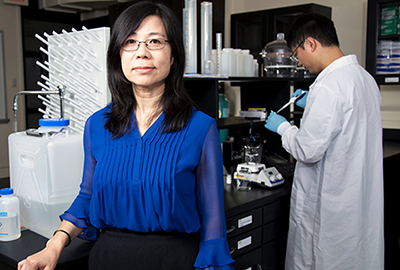UAlbany Launches New Degrees in Environmental & Sustainable Engineering
ALBANY, N.Y. (July 14, 2022) — With a focus on solving critical environmental problems from local through global scales, the University at Albany launched the Department of Environmental and Sustainable Engineering with a bachelor’s degree program in 2019.
Now the Department of Environmental and Sustainable Engineering (ESE) at the College of Engineering and Applied Sciences (CEAS) is taking the next step with expanded academic offerings at the master’s and PhD levels.
The master’s degree in Environmental and Sustainable Engineering program has been approved by the New York State Education Department, and UAlbany is accepting applications immediately. The program is designed to advance skills and technical depth to protect human health and the environment.
The program will offer both thesis and non-thesis options.
UAlbany is also launching a doctor of philosophy (PhD) program in environmental and sustainable engineering. The program tasks students with identifying new challenges and making game-changing contributions to protect human health and the environment. It will prepare students to conduct and supervise research which will lead to advanced expertise in a selected concentration.
“The new degree programs in Environmental and Sustainable Engineering fit within UAlbany’s core priorities of student success, research excellence, globalization, public engagement and community outreach, and diversity and inclusion,” said Provost and Senior Vice President for Academic Affairs Carol H. Kim. “We are grateful to the New York State Department of Education for their trust in us to provide a solid academic and research foundation for the future engineers who will provide the sustainable solutions to the environmental problems we face on a global level.”

Both new degree programs offer specialization in one of four concentration areas: water and wastewater, air quality, human health and the environment and sustainable engineering. Further, environmental and sustainable engineering degree programs are one of the most diverse and balanced academic disciplines in engineering, with 49.7 percent of all bachelor’s degrees awarded in the field in 2015 going to women.
“Students who enroll in these programs will be prepared to address the critical environmental concerns through sustainable approaches on local, national and global scales,” said ESE Professor and Chair Yanna Liang. “The programs will also train students to recognize, prepare for and respond to the rapid, enormous changes taking place in the environment, with a focus on engineering solutions to make lasting changes designed to improve the human condition across the planet.”
ESE is a discipline that builds on knowledge, discovery and information from math and basic sciences to solve critical global environmental problems. Among the many issues that environmental engineers endeavor to resolve are air pollution and prevention, water and wastewater treatment and reuse, water resource management, soil and groundwater clean-up and hazardous waste remediation.




